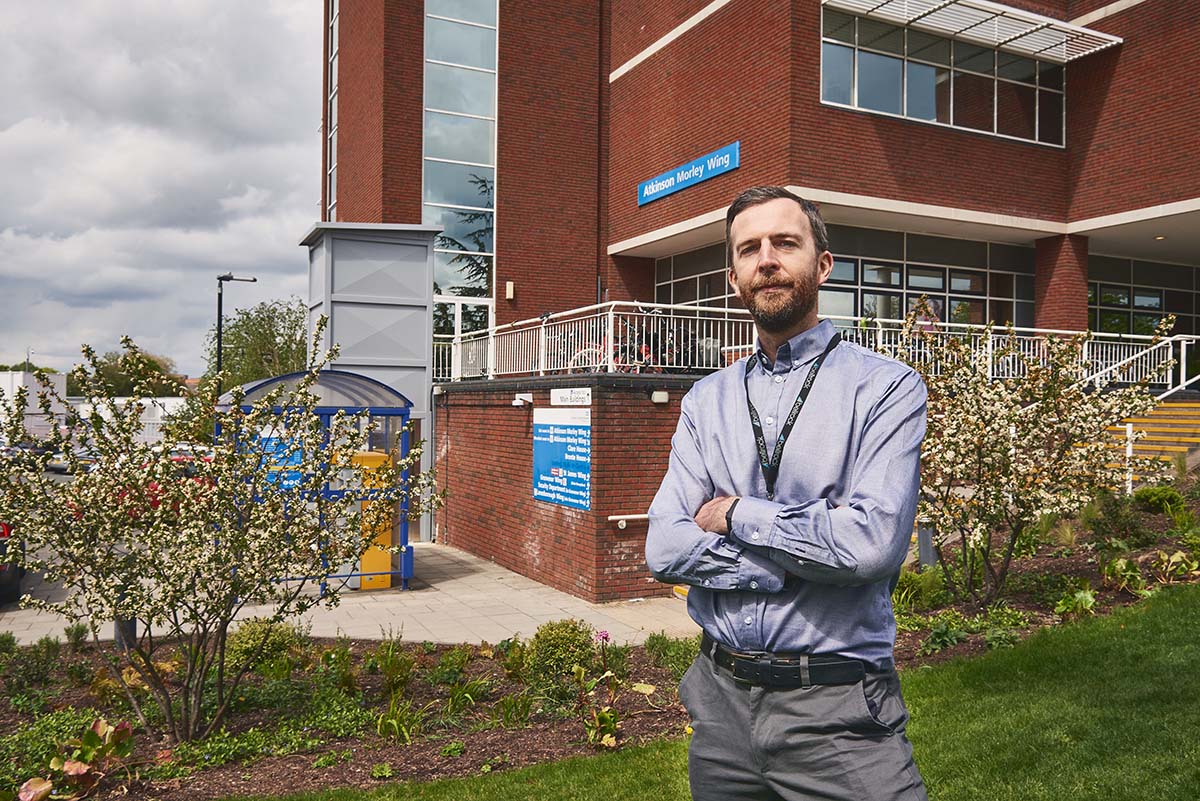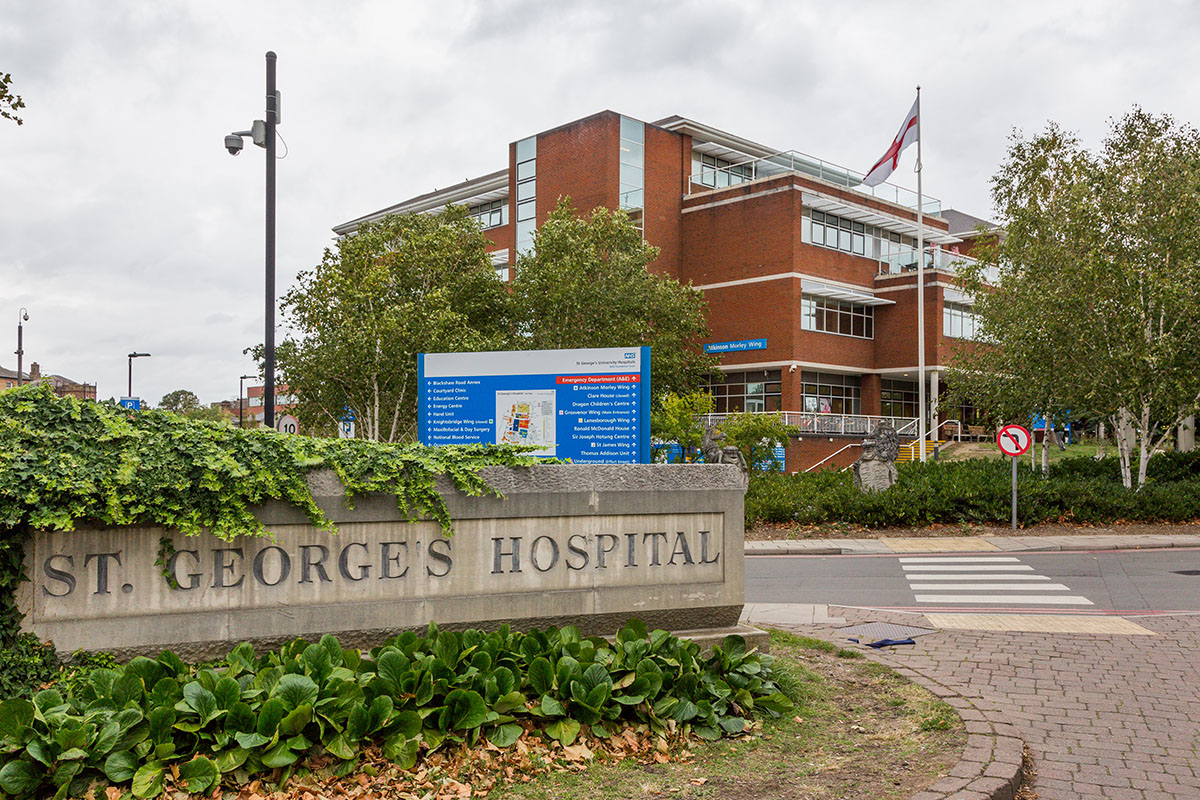Michael Sullivan – St. George’s Hospital NHS Trust – Atkinson Morley Wing

Michael Sullivan is the Facilities Manager for the Atkinson Morley Wing, St. George’s Hospital NHS Trust in London. Michael oversees the delivery of safe and compliant hard FM (predominantly engineering) for clinical services.
The Atkinson Morley is the Cardiothoracic and Neurosciences Unit, providing some of the most modern medical facilities within the UK. The unit operates out of a 1,000 room PFI building within the Trust’s estate. This accommodates 250 beds, eight operating theatres, five cardio-catheter labs, as well as 1.5T & 3T MRI and CT facilities.
“We, as in Bellrock Workplace and Compliance, are managing the Facilities Management agreement, which is directly with Blackshaw Healthcare Services, the PFI building owners, providing a safe and compliant building for NHS staff and patients”, says Michael. “In doing so, we also manage Bellrock M&E South, who are also based on-site, keeping on top of the engineering and making sure we are compliant, and the building is, and remains, fit for staff and patients to use.”
About Michael Sullivan
Michael started his career back in 2002 in the hospitality sector, overseeing the day-to-day runnings of his site, making sure everything was ready for when it was open for events. “I also have a degree in biology which is sort of unrelated”, he says. “To my advantage, it’s now come in handy when dealing with things like water management and controlling risk from legionella. In 2012, I moved into private healthcare, managing both hard and soft FM for hospitals in London. My career with Bellrock started in 2018, when I moved to my current role.”
A challenging 12 months
“The first surge of COVID was a big challenge because of the unknown. Our workplace and compliance team and the engineering team for BMES put together a business continuity plan where we split the teams into two, so that in the event that someone took ill, we wouldn’t all have to isolate and we could carry on the services uninterrupted. Suddenly, we had a lot of urgent works coming up that we had to deliver within a few days. As our wing turned into the pandemic wing taking care of the majority of COVID patients, the main challenge was to change the normal wards and some theatres into temporary ICU’s. We had to check up on things like power, ventilation, and medical gas requirements, making sure that they could be used for that purpose. We had a lot of additional works as well, such as putting in door sets to cordon off areas that are open bays and installing water plant to keep up with the increase in patients requiring dialysis. Our close partnership with BHS and the Trust, working together, ensured these works were planned, approved and delivered as swiftly as possible under the circumstances. On top of this, we were impacted when a few of our engineering team members caught Covid-19. Thankfully, everyone recovered and our service was not affected. Things only really started to quiet down in the summer and then it started to touch on going back to normal. However, by autumn, we were back to square one. This time, everyone knew what to expect”.
A sense of reward
The pandemic has powerfully highlighted just how much our society depends upon essential workers such as Facilities Managers. Alongside the exhaustive hours, the sense of uncertainty, the stress of delivering services while mitigating risk for not just their clients, but also for themselves, there comes a level of personal satisfaction and a sense of reward. “Knowing that we are creating a safe environment for the patients is very rewarding, they are our priority, says Michael. “You want to be compliant but at the same time, you want a great place for people to feel safe when they are in hospital, at a time, now more than ever, which people are quite scared about. Hopefully, when they can see a great environment around them, that gives them more confidence.”
Getting back to normal
As organisations are beginning to once again re-open their doors following easing of lockdown restrictions, Michael’s team is also taking steps to return to their ‘normal’ rhythm.
“Up until now, we have kept two separate teams but from the beginning of May, we will be going back to one whole team. This past week is the first week we have no confirmed COVID patients in the building, which is great and a real sense of victory! We still have our business continuity plan ready if anything happens again. We want to make it easier for the engineers to take time off again because previously, the team were on two week on/off shifts but still had to be on call. If the first team on site had a case of COVID they would have to come in, so it has been quite restless for them.”
“We’ve also been using Microsoft Teams just as most people. Whilst is has made things quicker to call a meeting and communicate to our team, I still think it’s better to see people in person, and I’m looking forward to that.”
The positives
While COVID and lockdown brought far more negative than positive impact into our lives, Michael and his team were able to find some silver linings.
“When we had to, we were able to deliver this contract with some of us working from home. Personally, I would not want to work from home full time, but I know now that we have plans in place whereby we could do it if something happens and this leaves us a bit more flexibility. I also feel we gained our client’s confidence; they now know we can deliver when we are not all together as a full team on site.”
On a personal note: Looking ahead post lockdown
Like everyone, we’ve all got things we’re looking forward to, and most of us are probably on the same page as Michael: “What am I looking forward to the most? Just seeing family again, especially extended family. My wife’s family is based in London, so it has been easier to see them. But my parents are down in Dorset, so I have not seen them since September now. I also have a sister who lives in France. We probably won’t be able to visit this year, but fingers crossed for next year.”

“Partnership between NHS Trusts and estates and facilities providers such as Bellrock has always been important to provide efficient running of services for patients, staff and visitors in a hospital.
Jenni DomanDeputy Director, Estates and Facilities Staff Governor St George’s University Hospitals NHS Foundation Trust
In the past 12 months this has become invaluable in light of the COVID pandemic and challenges that this has brought to healthcare environments.
Facilities Managers such as Michael, have had to work differently to meet the demands of the changes required and changes in guidance and work with a really dynamic approach working above and beyond and around the clock to support patient care.
Michael and the team have risen to these challenges finding ways to deliver changes to the environment and management of the Atkinson Morley Wing Estate to meet these demands and have continued to work flexibly to support the Trust often with little or no notice of changes required.
He and the team have been a credit to our industry and without this joint collaborative approach the Trust would have struggled to meet the demands of this pandemic.”






